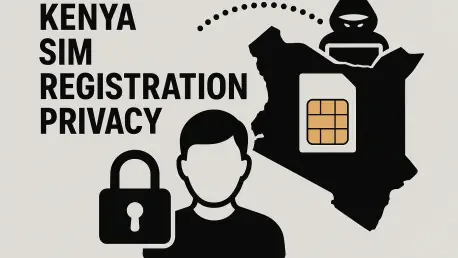In a digital era where personal data is often at the heart of privacy debates, a recent uproar in Kenya has spotlighted the intersection of telecommunications regulations and individual rights, raising critical questions about balancing digital safety with personal privacy. The Communications Authority of Kenya (CA) found itself addressing widespread public concern over rumors that mobile network operators were required to collect highly sensitive biometric information, including DNA, as part of updated SIM card registration rules. This speculation stirred anxiety among citizens and privacy advocates alike, prompting the CA to issue a formal clarification. The authority’s response not only tackled the misinformation but also shed light on the true intent behind the revised regulations. Far from mandating invasive data collection, the focus appears to be on bolstering security within the telecommunications sector. This situation sets the stage for a deeper exploration of the CA’s stance and the broader implications for Kenya’s mobile users.
Clarifying the SIM Registration Regulations
The heart of the controversy surrounding Kenya’s updated SIM card registration rules lies in the public’s misunderstanding of biometric data requirements. On November 18, the Communications Authority of Kenya explicitly denied any directive to mobile operators to collect sensitive information such as DNA, fingerprints, or retinal scans. The revised regulations, introduced earlier this year, contain no provisions for such data collection, despite including broad definitions of biometric markers like blood typing or voice recognition. Instead, the CA emphasized that the primary goal of these rules is to curb digital crimes, including SIM-related fraud and identity theft, which have plagued the telecommunications sector. By linking every SIM card to a verified individual, the authority aims to enhance the integrity of mobile services, particularly for critical applications like e-government and mobile money platforms. This clarification was crucial in dispelling fears of governmental overreach, reassuring subscribers that their privacy remains a priority under the current framework, while still addressing the pressing need for robust security measures in a digital-first society.
Balancing Security and Subscriber Privacy
Reflecting on the CA’s efforts to strengthen telecommunications security, it becomes evident that the authority has placed significant emphasis on protecting subscriber rights alongside implementing stricter regulations. The revised SIM card rules mandate that telecom operators adhere to stringent standards under the Data Protection Act and the Kenya Information and Communications Act, ensuring confidentiality in handling user information. Moreover, the regulations outline clear procedures for SIM suspension or disconnection, which can only occur due to false registration details or incomplete processes, and must be preceded by transparent communication with the affected subscriber. This approach demonstrates a commitment to fairness, addressing concerns raised by privacy advocates about the potential misuse of personal data. Looking ahead, the CA’s framework serves as a foundation for fostering trust in Kenya’s digital ecosystem, suggesting that future policies should continue to prioritize legal safeguards and public awareness to prevent misinformation, while exploring innovative solutions to combat digital fraud without compromising individual freedoms.









